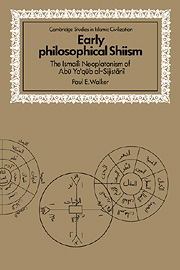Book contents
- Frontmatter
- Contents
- Preface
- Acknowledgments
- Note on transliteration
- List of abbreviations
- PART I AL-SIJISTĀNĪ'S HERITAGE
- PART II AL-SIJISTĀNĪ'S UNIVERSE
- 4 Introduction: categories of thought and terms of analysis
- 5 A theology of unqualified transcendence
- 6 Creation as command
- 7 Intellect, the sum of existent being
- 8 Descending and ascending soul
- 9 Nature and the physical realm
- 10 A cosmic anthropology
- 11 Prophecy, the deputy of intellect
- 12 Interpretation and its institution
- 13 Salvation and the womb of history
- EPILOGUE: THE USE AND CONTROL OF REASON
- Notes
- Select bibliography
- Index
13 - Salvation and the womb of history
Published online by Cambridge University Press: 02 November 2009
- Frontmatter
- Contents
- Preface
- Acknowledgments
- Note on transliteration
- List of abbreviations
- PART I AL-SIJISTĀNĪ'S HERITAGE
- PART II AL-SIJISTĀNĪ'S UNIVERSE
- 4 Introduction: categories of thought and terms of analysis
- 5 A theology of unqualified transcendence
- 6 Creation as command
- 7 Intellect, the sum of existent being
- 8 Descending and ascending soul
- 9 Nature and the physical realm
- 10 A cosmic anthropology
- 11 Prophecy, the deputy of intellect
- 12 Interpretation and its institution
- 13 Salvation and the womb of history
- EPILOGUE: THE USE AND CONTROL OF REASON
- Notes
- Select bibliography
- Index
Summary
Moving finally to the all important question of man's ultimate purpose, al-Sijistānī again confronts the two trends in his thought that persist in conflict: history and philosophy. The issues in this case revolve around the meaning of the Arabic terms ba̔th and qiyāma. Both mean resurrection and might be used interchangeably in most Islamic accounts. However, al-Sijistānī employs each in an apparently different sense, leading to a complicated doctrine concerning the salvation and resurrection of the soul not easily recognized or understood, perhaps by intention. He almost certainly hints at a distinction in his polemical al-Iftikhr, where he has written two separate chapters, one for each of these terms. There is also much additional material in his al-Maqālīd. Close examination of these chapters and other passages, however, does not readily admit to a firm statement in the matter. What follows is therefore in part an interpretation of what evidence they contain and what problems remain.
To begin with for al-Sijistānī the concept of ba ‘th or ba ‘th ba ‘d al-mawt applies to the survival of the soul after it ceases its connection to a particular body. The natural, corporeal existence it once shared comes to an end; the body dies and dissolves into its constituent elements. He states forthrightly that there is no resurrection for the body, none at all. How then to translate ba ‘th? The term “salvation,” if it bears the sense of survival and eternal existence, is appropriate, although with reservations.
- Type
- Chapter
- Information
- Early Philosophical ShiismThe Isma'ili Neoplatonism of Abu Ya'qub al-Sijistani, pp. 134 - 142Publisher: Cambridge University PressPrint publication year: 1993

